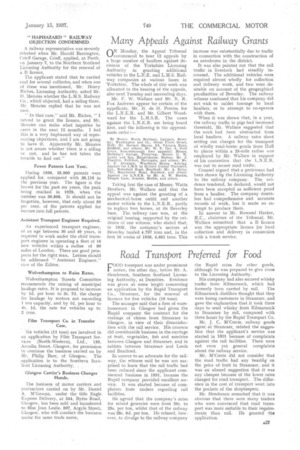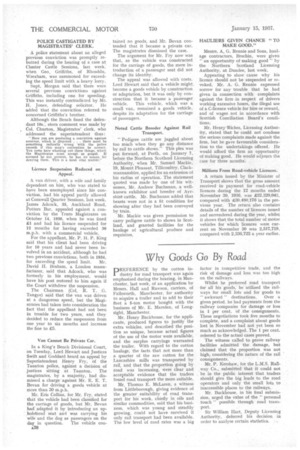Road Transport Preferred for Food
Page 29

Page 30

If you've noticed an error in this article please click here to report it so we can fix it.
FOOD transport was under prominent notice, the other day, before Mr. A. Henderson, Southern Scotland Licensing Authority, at Dumfries. Evidence was given at some length concerning
• an application by the Rapid Transport Co., Stranraer, for the renewal of licences for five vehicles (10 tons).
The manager said that a firm of warehousemen in Glasgow had given the Rapid company the contract for the carriage of cheese from Stranraer to Glasgow, in view of their dissatisfaction with the rail service. His concern did considerable business in the carriage of fruit, vegetables, fish and sundries between Glasgow and Stranraer, and in rabbits between Straiiraer and Leeds and Bradford.
In answer to an advocate for the railway, the witness said he was not surprised to learn that the rail traffic had been .reduced since the applicant commenced business in 1931, because the Rapid company provided excellent service. It was started because of C0111'plaints from traders regarding rail facilities.
He agreed that the company's rates for mixed groceries were from 20s. to 25s. per ton, whilst that of the railway was 28s. 6d. per ton. He refused, however, to divulge to the railway company the Rapid rates for other goods, although he was prepared to give these to the Licensing Authority.
His company had also secured whisky traffic from Kilmarnock, which had formerly been carried by rail. The Kilmarnock distillers thought that they were losing customers in Stranraer, and gave the explanation that it took three days to send whisky from Kilmarnock to Stranraer by rail, compared with three hours by the Rapid Transport Co.
Mr. J. C. IVI'Crerie, railway goods agent at Stranraer, refuted the suggestion that the applicant's service was started in 1931 because of complaints against the rail facilities, There were not even yet general complaints about the railway service.
Mr. M'Crerie did not consider that the road traffic had any beariAg on the price offruit in Stranraer, and it was an absurd suggestion that it was any cheaper because of the lower rates charged for road transport. The difference in the cost of transport went into the pockets of the shopkeepers.
Mr. Henderson .remarked that it was obvious that there. were many traders who were convinced that road transport was more suitable to their requirements than rail. He granted -the application.
POLICE CASTIGATED BY MAGISTRATES' CLERK.
A police statement about an alleged previous conviction was promptly rebutted during the hearing of a case at Chester Castle Sessions, last week, when Geo. Griffiths, of Rhosddu. Wrexham, was summoned for exceeding the speed limit with a heavy lorry.
Supt. Morgan said that there were several previous convictions against Griffiths, including one for speeding. This was instantly contradicted by Mr. H. Jones, defending solicitor. He added that the conviction referred to concerned Griffiths's brother.
Although the Bench fined the defendant 10s:, stern comment was made by Col. Churton, Magistrates' clerk, who addressed • the superintendent thus:
Here you are producing a conviction against someone, which is disputed . . . there must be something radically wrong with the police records it this man's contention be correct. You come here wheeling out these things, which the Magistrates must accept as gospel. If accused be not present, he has no means for denying them. This is a most vital matter."
Licence Suspension Reduced on Appeal.
A van driver, with a wife and family dependent on him, who was stated to have been unemployed since his conviction, had his appeal partly allowed at Cornwall Quarter Sessions, last week. James Adcock, 35, Auckland Road, Potters Bar, appealed against a conviction by the Truro Magistrates on October 14, 1936, when he was fined £1 and had his licence suspended for 12 months for having exceeded 30 m.p.h, with a commercial vehicle.
For the appellant, Mr. P. H. P. King said that his client had been driving for 10 years and had never been involved in an accident, although he had two previous convictions, both in 1934,
for exceeding the speed limit. Mr. David H. Braham, a London manufacturer, said that Adcock, who was formerly in his employment, would have his post restored to him again if the Court withdrew the suspension.
The Chairman (Col, R. T. G. Tangye) said that the van was driven at a dangerous speed, but the Magistrates had taken into consideration the fact that the appellant had not been in trouble for two years, and they decided to reduce the suspension from one year to six months and increase the fine to £5.
Van Cannot Be Private Car.
In a King's Bench Divisional Court, on Tuesday, Lord Hewart and Justices Swift and Goddard heard an appeal by Superintendent Henry Fry, of the Taunton police, against a decision of justices sitting at Taunton. The magistrates, by a majority, had dismissed a charge against Mr. E. E. T. Bevan for driving a goods vehicle at more than 30 m.p.h.
Mr. Eric Collins, for Mr. Fry, stated that the vehicle had been classified for the carriage of goods, but Mr. Bevan had' adapted it by introducing an upholstered seat and was carrying his wife and the dog as passengers on the day in question. The vehicle cona28
tained no goods, and Mr. Bevan contended that it became a private car. The magistrates dismissed the case.
The argument for Mr. Fry now was that, as the vehicle was constructed for the carriage of goods, the mere introduction of a passenger seat did not change its identity.
The appeal was allowed with costs. Lord Hewart said that a vehicle might become a goods vehicle by construction or adaptation, but it was only by constniction that it became a passenger vehicle. This vehicle, which was a small van, remained a goods vehicle, despite its adaptation for the carriage of passengers.
Noted Cattle Breeder Against Rail Transport.
" Pedigree cattle are juggled about too much when they go any distance by rail to cattle shows." This plea was put forward, at Perth, on January 7, before the Northern Scotland Licensing Authority, when Mr. Samuel Mackie, 19, Mount Pleasant, Tillicoultry, Clackmannanshire, applied for an extension of his radius of operation. The statement quoted was made by one of his witnesses, Mr. Andrew Buchanan, a wellknown exhibitor and breeder of Ayrshire cattle. Mr. Buchanan added that beasts were not in a fit condition for showing after they had been conveyed by train.
Mr. Mackie was given permission to carry pedigree cattle to shows in Scotland, and granted facilities for the haulage of agricultural produce and requisites, HAULIERS GIVEN CHANCE "TO MAKE GOOD."




















































































